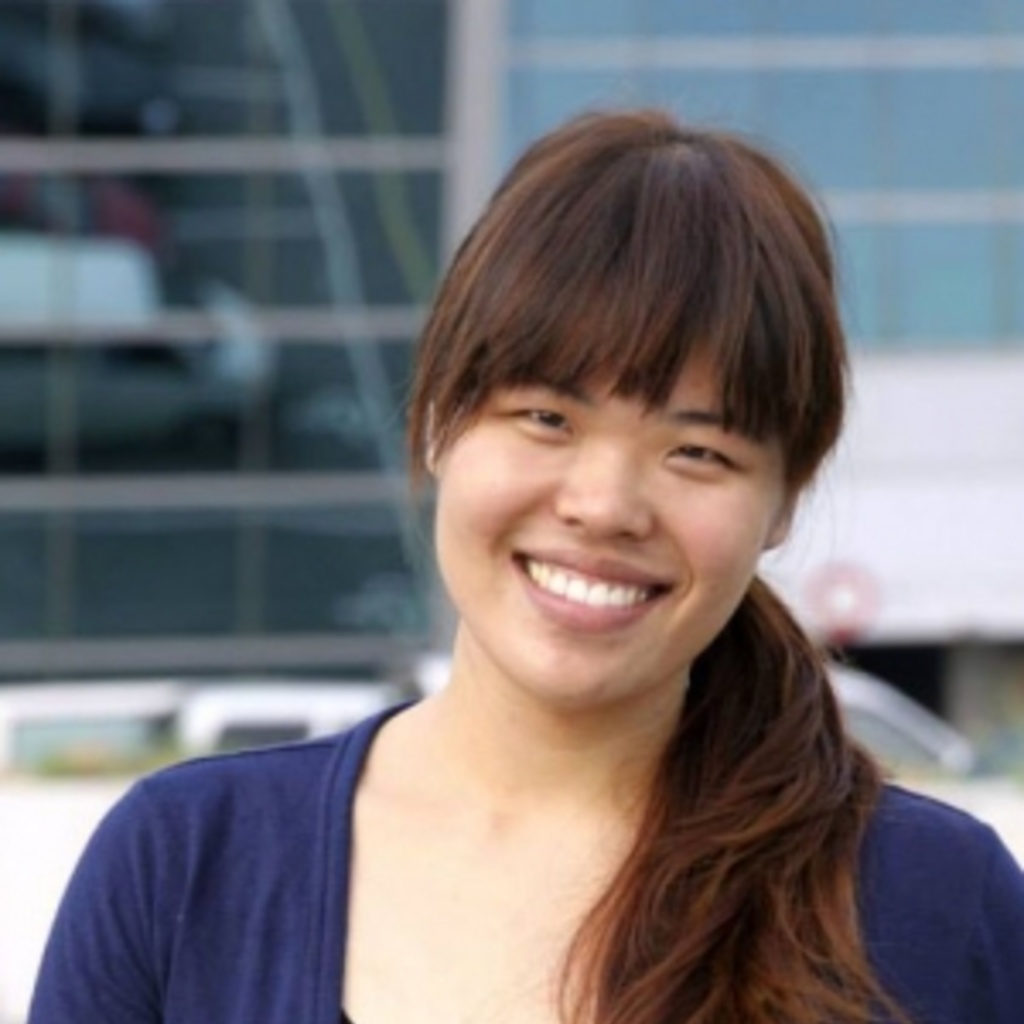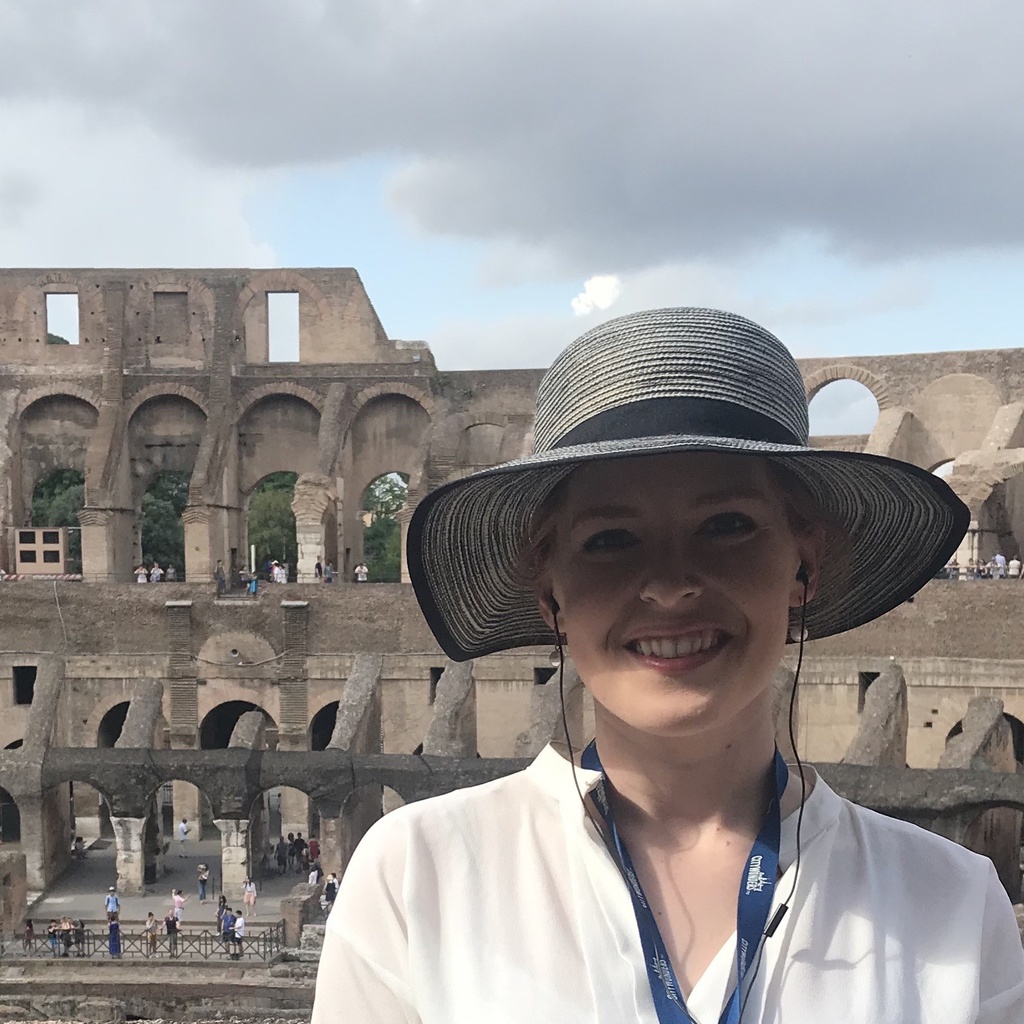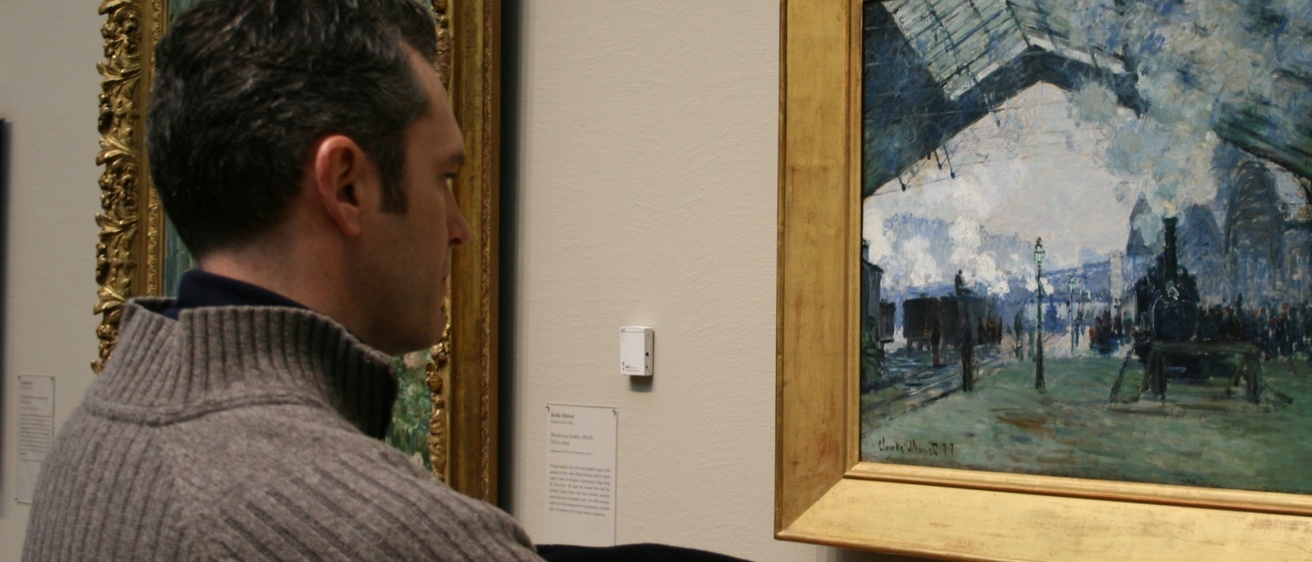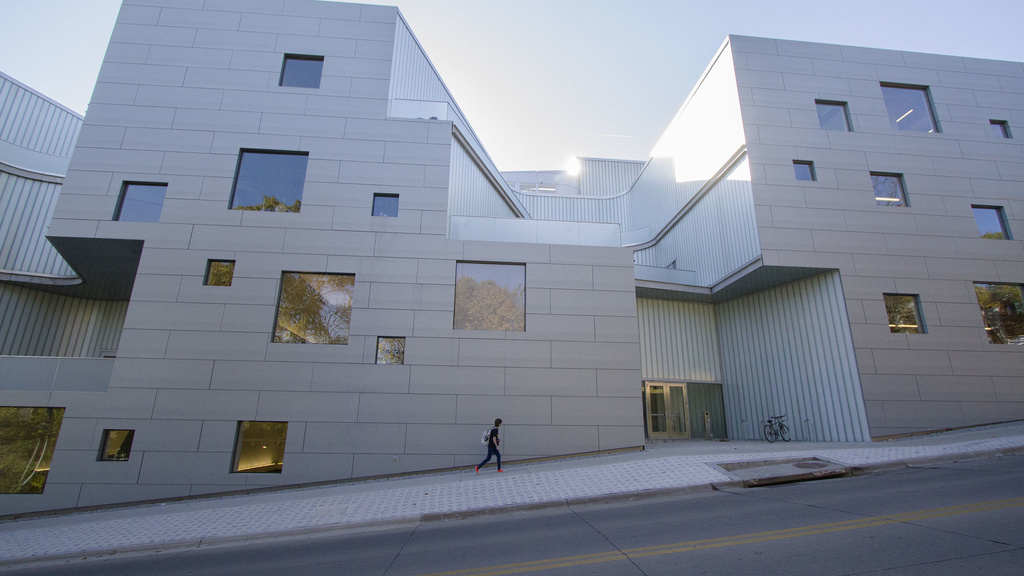Main navigation
Master of Arts (MA) in Art History
Our PhD program provides scholarly challenges, research skills, and mentoring necessary for professional development and successful careers.
The PhD program in Art History prepares students to excel in premier roles in the field, as professors, museum curators, gallery directors, and other leading positions in the world of visual culture. From the moment you join our graduate program, a peer mentor will help you acclimate to the department, university, and the beautiful city. In our award-winning Art Building West, you’ll have a dedicated desk in our light-filled Art Library, where the windows stretch from floor to ceiling, and another in the communal TA office.
Our faculty is deeply committed to mentoring individual students and the entire cohort, ensuring personalized guidance and support throughout your academic journey. Each semester, we offer a professional development course called Colloquium, where faculty and students collaborate on practice presentations, writing successful fellowship applications, creating effective curriculum vitae, conducting archival research, job market advice, and strategies for effective teaching. Our students frequently publish academic papers and present at national and international conferences, showcasing their research and contributing to the global art history discourse.
Students are typically supported by multi-year funding packages involving a combination of teaching assistantships and scholarships; supplemental funding is also available for conference presentations and research travel, in the summer as well as in the academic year. PhD students develop a broad and deep knowledge of art history by taking two years of coursework beyond the MA, gaining further teaching experience, and developing a second research language before taking comprehensive exams that cover one major area and two minor areas. After these exams, students undertake original research that often involves international travel, fieldwork, and archival study, before writing dissertations that stand as important original contributions to scholarly discourse in the field. Because of the rigor of this program, our students have achieved high placement rates in landing academic and museum jobs, and in achieving professional success more generally.
The opportunity to earn a graduate certificate in Public Digital Humanities further enhances your skill set and broadens your career prospects. You’ll have access right in our building to a dedicated Art Library with unrestricted global interlibrary loan, providing a wealth of resources for your studies. With such a supportive and resource-rich environment, our graduate program in Art History is designed to help you thrive academically and professionally.
Requirements, admission, and program information
Degree requirements
The Doctor of Philosophy program in art history requires a minimum of 72 semester hours of graduate credit. PhD students are expected to acquire great breadth and depth of knowledge in the discipline of art history, achieve a high level of expertise in a specialized field, and demonstrate professional speaking and writing skills. The program provides them with scholarly challenges, research skills, and mentoring necessary for professional development and successful careers.
PhD students must maintain a grade-point average (GPA) of at least 3.50. They may count a maximum of 38 semester hours of work completed for the MA toward the PhD. Students are allowed only one semester of academic probation.
To establish academic residency, doctoral students must be enrolled full-time (at least 9 semester hours) at The University of Iowa for two semesters beyond their first 24 semester hours of graduate study; or they must enroll for at least 6 semester hours in each of three semesters during which they hold an assistantship of one-quarter-time or more. Resident tuition is assessed for assistantship semesters and adjacent summer sessions.
PhD students major in one of the following distribution fields: Asian, Ancient Mediterranean, Medieval, Renaissance and Baroque, 18th- and 19th-century European, American, and Modern/Contemporary. In addition, candidates minor in two fields; any of the previous plus African. One minor must be in an art history distribution field that is non-contiguous with the major field. The second minor may be in any art history distribution field, OR it may be in a relevant discipline outside the Division of Art History, subject to approval of the Art History faculty.
PhD students must complete a publishable dissertation that makes an original contribution to the art history discipline and demonstrates evidence of superior understanding of critical issues in the student's chosen specialization field.
For more detailed information, consult the art history policies and procedures.
Admission
Applications to the PhD program in art history, with all supporting materials and requests for financial aid, must be received by Jan. 10 for fall admission in the following year. Please apply now for complete application information. Applicants must hold an MA in art history or a related graduate degree and must demonstrate proficiency in their major research language for admission to the PhD program in art history. Proficiency in a second non-English language, chosen in consultation with the faculty advisor, is required by the end of the fourth semester of PhD work; see the "Language requirement" section for more details.
Although exceptions may be made when other components of the application are strong, applicants should have a graduate grade-point average (GPA) of at least 3.50 on a 4.00 scale.
Students who completed an MA at the University of Iowa and who wish to apply for entrance into the PhD program must make a formal application to the program. (Please see Graduate Program Coordinator for procedures.) Applications are evaluated in the context of the entire applicant pool.
Required courses
PhD students must satisfactorily complete ARTH:4999 History and Methods, even if they have completed a similar course at another institution (students who have completed the course for a master's degree or other previous work at Iowa are exempt). They must register for an art history seminar in their first three semesters of PhD course work (or in their fifth, sixth, and seventh semesters of graduate study), before the PhD readings course and comprehensive exam. They also must satisfactorily complete ARTH:6020 Art History Colloquium every semester that they are enrolled for 9 semester hours or more or are serving as teaching or research assistants. Students who are not employed as teaching or research assistants or are registered for less than 9 semester hours are strongly encouraged to attend the colloquium.
Up to 6 semester hours of credit for dissertation research may be applied toward the 72 semester hours required for the degree. Courses outside the curriculum of the School of Art, Art History, and Design's art history division do not carry art history credit.
Directed Studies
Normally, a maximum of 6 semester hours earned in ARTH:6040 Directed Studies may be applied toward the semester-hour requirement for the PhD, although doctoral students may petition the art history faculty for permission to apply up to 9 semester hours.
Language requirement
PhD students must demonstrate proficiency in their major research language for admission to the PhD program in art history. They must demonstrate proficiency in a second non-English language, chosen in consultation with the faculty advisor, by the end of the fourth semester in the PhD program. Students may demonstrate proficiency by a) two years of university-level coursework, b) earning a grade of B or better in a 3000-level advanced language course, c) achieving at least an 80% proficiency score on the level 5 milestone of the relevant Rosetta Stone language program, or d) in exceptional circumstances, making a direct petition to the faculty after receiving the recommendation of their advisor. Language courses do not carry degree credit.
PhD committee
The PhD committee consists of the student's dissertation adviser, who is responsible for the major field, two members responsible for the two minor fields, and at least two additional members. Of these five, four must be tenured or tenure-track faculty members from the art history division. One must be from outside the division and must be a member of the Graduate College faculty. When appropriate, committees may include additional members.
Comprehensive examination
Upon completion of course requirements, the PhD candidate takes three written comprehensive examinations. The major exam consists of six questions and lasts six hours; the two minor exams each consist of three questions and last three hours. The exams normally are taken on any three days within one week (Monday through Friday).
The scope of the comprehensive exams is determined in consultation with the candidate's degree committee supervisor and the committee members responsible for the two minor fields.
Oral comprehensive examination
Within approximately two weeks of completing the three written exams, the candidate meets with their degree committee for the oral comprehensive examination, which concentrates on questions that arise from the written comprehensive exams.
Dissertation proposal
As soon as possible after completing the comprehensive examinations, the candidate submits a dissertation proposal to his or her degree committee supervisor and subsequently to the degree committee. The committee meets as a group with the candidate to discuss the dissertation proposal and to offer comments and suggestions. (The proposal must be submitted to the committee at least two weeks before the approval meeting.) The proposal includes a 1-2 page abstract, a 10-15 page précis (including a review of the state of the field), and a bibliography.
After the proposal has been approved by the committee, the candidate circulates an abstract to the entire art history faculty. The candidate must give a public presentation on the dissertation topic no later than the end of the semester following the degree committee's approval. The presentation is scheduled with the head of art history.
Final examination
Upon completing a dissertation, which constitutes an original scholarly contribution to the field, the candidate meets with the PhD committee for an oral defense of the dissertation. The oral defense constitutes the final examination for the PhD. The successful completion of this examination normally marks the last stage in the candidate's fulfillment of requirements for the degree.
Strengths and resources
Modern studies
Modern studies constitute a significant strength of the program, with four faculty members offering courses and seminars in 18th-, 19th- and 20th-century American and European art and contemporary art and architecture. Students also have opportunities to participate in a variety of interdisciplinary programs in American and European history, literature, and politics.
18th- and 19th-century French and European art
Study of 18th- and 19th-century French and European art is greatly enriched by the De Caso collection of rare books and archives housed in the Art Library. Rare visual materials that are part of this collection have been digitized by the Office of Visual Materials.
20th century art
A major resource for 20th-century art is the International Dada Archive. Founded in 1979, it remains an invaluable resource for students and faculty at the University of Iowa as well as for Dada scholars throughout the world. Moreover, the University of Iowa Special Collections has a number of archives related to twentieth-century artists and artistic movements, from the Fluxus West Collection to the papers of Buster Cleveland. Moreover, the University of Iowa Museum of Art has an extensive collection of art from this period, the centerpiece of which is Jackson Pollock's Mural. In addition to the permanent collection, the UIMA hosts exciting rotating exhibitions such as "Napoleon and the Art of Propaganda" (2012) and “New Forms: The Avant-Garde Meets the American Scene, 1934-1949” (2013).
African art
The Stanley Collection of African Art at the Stanley Museum of Art is one of the country’s most well-respected collections of African art and provides an invaluable resource for graduate students.
Ancient and medieval studies
Ancient and medieval studies is another key strength of the program, with three faculty members offering courses and seminars in Egyptian, Near Eastern, Greek, Roman, and medieval art. Students also have the opportunity to study in a variety of related programs in ancient or medieval history, literature, and religion. They are encouraged to participate in the activities of the local chapter of the Archaeological Institute of America as well as the Medieval Studies Program and Iowa Forum of Graduate Medievalists. The University of Iowa Museum of Art provides a unique opportunity to handle Etruscan and South Italian vases while casts of bronze objects from Pompeii are available for close study on campus, and the nearby Cedar Rapids Museum of Art features a number of ancient portraits, from Alexander the Great to Marcus Aurelius. The University of Iowa Special Collections is home to a number of medieval manuscripts, and classes offered by the world-renowned Center for the Book complement these holdings.
Facilities
Create your academic path
You'll find degree overviews, requirements, course lists, academic plans, and more to help you plan your education and explore your possibilities.
Current course list
The MyUI Schedule displays registered courses for a particular session and is available to enrolled students. The list view includes course instructors, time and location, and features to drop courses or change sections.
Need more information?
For more information on the University of Iowa School of Art, Art History, and Design PhD, please contact:
Art history faculty

Björn Anderson

Robert Bork

Erin Hein

Amy Huang

Anna Isbell

Dorothy Johnson




